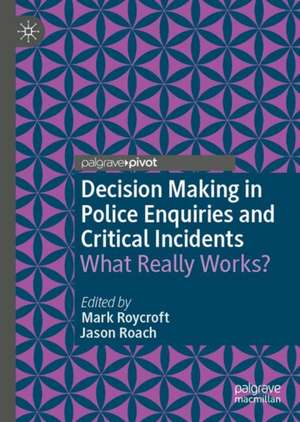Decision Making in Police Enquiries and Critical Incidents: What Really Works?
Editat de Mark Roycroft, Jason Roachen Limba Engleză Hardback – 7 feb 2019
Preț: 485.99 lei
Nou
Puncte Express: 729
Preț estimativ în valută:
93.01€ • 96.85$ • 78.60£
93.01€ • 96.85$ • 78.60£
Carte tipărită la comandă
Livrare economică 10-24 martie
Preluare comenzi: 021 569.72.76
Specificații
ISBN-13: 9781349958467
ISBN-10: 1349958468
Pagini: 140
Ilustrații: XV, 168 p. 5 illus., 1 illus. in color.
Dimensiuni: 148 x 210 x 17 mm
Greutate: 0.38 kg
Ediția:1st ed. 2019
Editura: Palgrave Macmillan UK
Colecția Palgrave Pivot
Locul publicării:London, United Kingdom
ISBN-10: 1349958468
Pagini: 140
Ilustrații: XV, 168 p. 5 illus., 1 illus. in color.
Dimensiuni: 148 x 210 x 17 mm
Greutate: 0.38 kg
Ediția:1st ed. 2019
Editura: Palgrave Macmillan UK
Colecția Palgrave Pivot
Locul publicării:London, United Kingdom
Cuprins
1. Introduction; Mark Roycroft.- 2. History of Investigative decision making from public inquires and reviews; Dr Mark Roycroft.- 3. The decision making and identification of solving factors from 166 murder cases; Dr Mark Roycroft.- 4. Innate reasoning and critical incident decision-making; Prof Robin Bryant.- 5. How a major incident Room operates and the management of critical incidents; ex DCI Harland N Yorks Police.- 6. “The Making of an expert detective” Decision making in Norway and UK European perspective; Ivar Fashing, Superintendent and Professor Norwegian Police University.- 7. The task is greater than the title: Professionalising the role of the Senior Investigating Officer in Homicide Investigations; Dr Adrian West and Dr Declan Donnelly.- 8. The retrospective detective. Cognitive bias and the cold case investigation; Dr Jason Roach.- 9. Conclusions; Dr Mark Roycroft.
Notă biografică
Mark Roycroft is Senior Lecturer at The Open University, UK, and he has lectured on terrorism, organised crime, criminology and investigative theory. He was formerly a police officer for 30 years in the Metropolitan Police Service with postings in homicide teams, counter terrorism and criminal intelligence. He is the author of Police Chiefs in the UK.
Jason Roach is the Director of the Applied Criminology and Policing Centre at the University of Huddersfield, the Editor of The Police Journal, and a chartered psychologist. Jason has worked in an academic setting for the past 15 years He has published research on a wide-range of topics including: investigative decision-making, terrorism, cold-case homicides, and evolutionary psychology. He has also co-authored three books with Professor Ken Pease, the most recent being Self-Selection Policing in 2016. His main area of research expertise is with police and offender decision-making.
Jason Roach is the Director of the Applied Criminology and Policing Centre at the University of Huddersfield, the Editor of The Police Journal, and a chartered psychologist. Jason has worked in an academic setting for the past 15 years He has published research on a wide-range of topics including: investigative decision-making, terrorism, cold-case homicides, and evolutionary psychology. He has also co-authored three books with Professor Ken Pease, the most recent being Self-Selection Policing in 2016. His main area of research expertise is with police and offender decision-making.
Textul de pe ultima copertă
This book examines how the police make decisions in real life situations, particularly in major enquiries. The two key themes explored are real-time decision making along with what “works” in such circumstances. It aims to set out how successful decisions are arrived at in a variety of difficult and time-constrained situations and discusses the lessons that can be learnt from this. Written by practitioners and academics, the book explores a range of topics, from the decision making process involved operational matters and in difficult-so-solve murder enquiries. It not only examines decision making but also how experienced decision makers function. It looks at the psychology of police decision making, decision making involved in cold case investigations, and discusses the need for “grip” during major investigations. The contributors are experienced and respected practitioners and academics This book will appeal particularly to those studying Policing and Criminology and alsoto Investigating Officers and those involved in professionalising investigative practice.
Caracteristici
Comes from a mixture of practitioners and well-informed scholars Offers a a key addition to the fields of criminology, criminal justice and policing studies as well as for police professional leaders concerned with policy Asks: what qualities does an individual need to be a good police decision maker within a fast-moving environment?
